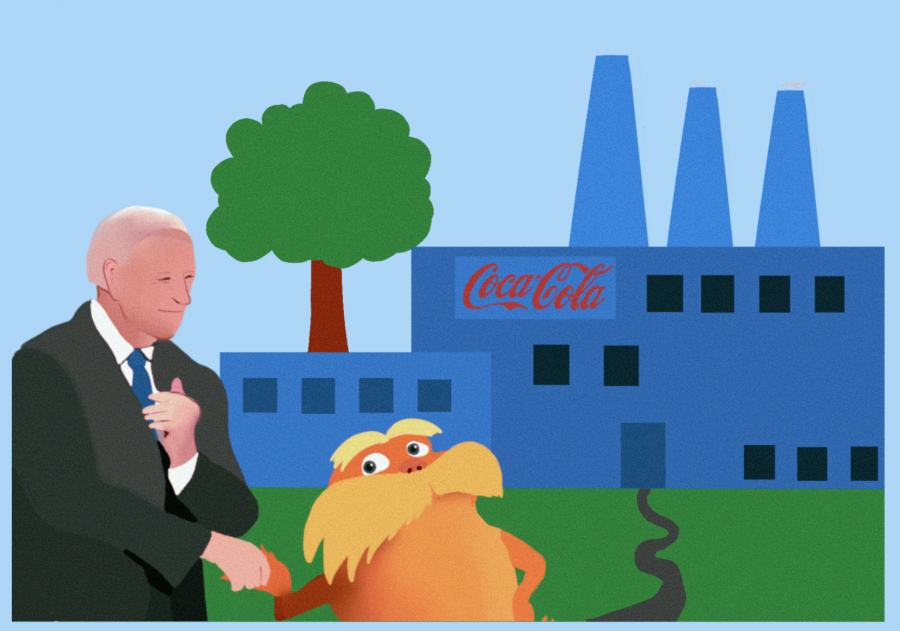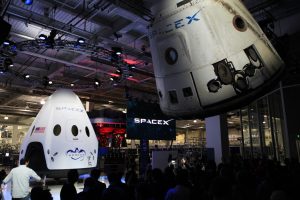Corporations shift focus toward sustainability and recyclable products
February 20, 2021
Several of the world’s top global plastic polluters have started the new year with new initiatives to prioritize the environment and sustainability.
Coca-Cola Co. recently unveiled plans to distribute bottles made completely from recycled materials to cut back on the company’s use of plastic, the company shared in an announcement earlier this month.
The global beverage giant will first distribute the new, eco-friendly 13.2-ounce bottles of Coca-Cola, Coke Zero Sugar, Diet Coke and other Coca-Cola flavors in California, Florida, and select Northeast states.
“On-the-go consumers have been telling us they want an option like this, because it’s just the right amount for the ‘snacking’ occasion,” Tammy Lee, brand manager of Coca-Cola, said in the announcement. “We believe this innovation delivers the double benefit of convenience and sustainability.”
Coca-Cola brands Sprite, DASANI and Glaceau Smartwater will also release new bottles made from 100% recycled materials in select states later this year, according to the announcement.
Coca-Cola’s campaign is a sharp turn in the company’s stance on its plastic products.
Bea Perez, Coca-Cola’s head of sustainability, defended the brand’s continued production of plastic bottles at the World Economic Forum last year, claiming consumers demanded them because of their lightweight resealable design, according to BBC News.
The beverage company was also found to be the worst global plastic polluter of 2020 in a global audit published by Break Free From Plastic, a distinction they have held for the past three years.
Coca-Cola estimates their new bottles will cut their use of plastic among their North American brands by 20% compared to 2018 and reduce 10,000 metric tons of the United States’ annual greenhouse gas emissions, according to their own analyses.
“This marks a major milestone in a large and complex market,” said Alpa Sutaria, the general manager of sustainability at Coca-Cola’s North America operating unit. “While we still have a lot of work to do to reduce plastic waste, by educating consumers about recycling and the potential for plastic bottles to become new plastic bottles, we see this as a big move in the right direction.”
Unilever plc, one of the top five global polluters in Break Free From Plastic’s 2020 global audit, has also addressed the environmental problems some of its brands contribute to.
The company teamed with A Plastic Planet, a grassroots campaign fighting to “inspire the world to turn off the plastic tap,” last month by designing Dove’s first refillable deodorant system.
The new packaging is made with 54% less plastic than Dove’s standard products, and stainless steel to increase the product’s durability.
“The things we buy for life are often the things we treasure the most – that’s why we’ve dedicated two years to creating our first ever refillable deodorant that’s beautiful, as well as sustainable,” Dove said on its website.
Dove’s new refillable deodorant is part of a larger initiative by the beauty brand to reduce its use of plastic packaging and is Unilever’s first widespread campaign centered on a refillable product.
“We have been very involved in helping craft the overall messaging of the idea, who the audience would be, and how it could influence other Unilever brands,” Sian Sutherland, cofounder of A Plastic Planet, said to Packaging World.
“Our role, past and future, will be to work closely with the wider team to see how the next iterations of this beautiful structure can have even less plastic, less impact, and more permanence, especially on the refill system,” Sutherland added.
This new trend among the top corporate plastic polluters is a result of an increased demand for sustainable products from consumers.
Although sustainability and eco-friendly practices were not at the forefront of consumer concerns in past decades, millennial and Generation Z consumers have shown it has an influence on the brands they buy and the money they spend.
A Nielsen study discovered 66% of consumers would spend more on a sustainable brand and its products, according to Forbes.
“Today, brands look for innovative packaging because their customers care about waste,” said Jermia Adatte, administrator and designer of Adatte Design, according to Nasdaq.
Nestlé and PepsiCo Inc. have also addressed their contribution to the global plastic pollution problem and set goals to make their packaging recyclable in upcoming years.
Although these recent moves have been in the consumer’s interest, sustainability experts have continued to emphasize the importance of urgency in moving from single-use plastics to renewable, recyclable and compostable packaging.
“We need to stop plastic production, phase out single-use and implement robust, standardised reuse systems,” Emma Priestland, global corporate campaigns coordinator for Break Free From Plastic, said in a press release.
“Coca-Cola, PepsiCo and Nestlé should be leading the way in finding real solutions,” Priestland added.








